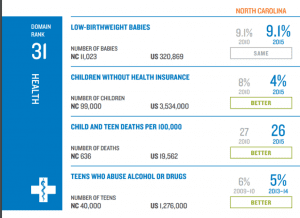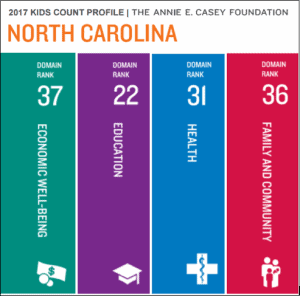By Laila A. Bell
The latest KIDS COUNT Data Book shows a mixed bag for North Carolina children. The Data Book analyzes 16 measures of child well-being to produce an annual snapshot of how children fare in four areas: education, economic well-being, health, and family and community. The report shows North Carolina has made strides in critical areas of child well-being, but continues to lag behind in economic security for children and families
Fewer children in North Carolina are uninsured, which is good news. Between 2010 and 2015, North Carolina cut children’s uninsurance rates in half thanks to a boost in coverage provided by public health insurance programs like Medicaid and NC Health Choice, and gains in the private market under the Affordable Care Act. (Take action here to urge Senators Burr and Tillis to protect children’s health insurance and oppose current proposals to cut Medicaid.) In fact, North Carolina improved in three of the four health-related indicators as child death rates declined and fewer teens used alcohol or drugs.
Despite these improvements, North Carolina ranks 33rd in the nation for overall child well-being placing us among the poorest performing states in outcomes for children and youth. (Read the Data Book here or access the state profile page here).
North Carolina’s child well-being rank is constrained by continued challenges in economic well-being, where the state received its lowest ranking at 37th in the nation. North Carolina tied for the 13th highest child poverty rate in the country and fares worse than the national average in three out of the four measures of economic well-being. Additionally, the report finds an increase in the percentage of children living in high-poverty areas as poverty has become increasingly entrenched for many children in our state. If left unchecked, widespread economic hardship during our children’s earliest years may translate into difficulties later in life, including future academic, health, or even employment challenges as children age and transition into adulthood.
Policymakers should view these data as a roadmap for efforts to improve opportunity for North Carolina children and youth. States with the highest KIDS COUNT Data Book rankings make strategic investments in education, health, and economic well-being that generate dividends in the well-being of their children and youth. Improving North Carolina’s ranking in child well-being requires bold leadership from our elected officials and deliberate efforts to prioritize policy decisions that strengthen and promote economic well-being for North Carolina children and families.

